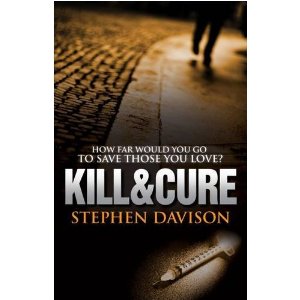Published: 2009
Author: Stephen Davison
A run of the mill thriller with too many characters and not enough character development
One of the basic laws of crime thrillers is that they must have a flawed hero – the rule breaking detective, the alcoholic journalist or the idealistic doctor. We’ve all read the novels and recognise the standard characters, some are great, some are woefully cliché ridden. Stephen Davison’s addition to this rolecall is the hero of Kill and Cure, David ‘Stich’ Stichell, a somewhat clueless chiropractor. I suspect Stich is the only chiropractor hero in the history of crime literature.
It’s hard to discuss Kill & Cure without giving away too much of the plot. There’s an evil drugs company (just for once it would be good to have a friendly big business), there’s the fish out of water hero, there’s feisty women, there’s blackmail, there’s violent criminal sidekicks, there’s some cops. There’s twists, turns and shocks everywhere you turn. And therein lies the problem.
Kill & Cure is Stephen Davison’s first novel and it really does show. It’s almost like a stream of consciousness, a rookie novelist desperate to get everything that’s been in his head for years onto the page straight away. You can almost feel the excitement as new characters appear and a new plot twist is unveiled. The reader is bombarded with new names and facts almost every chapter. There’s just too much. I lost track of who were the crooks and who were the cops. Drug company names and drug names got confused in my head. I read a lot and I don’t think I’ve been as confused with any book as I have been with this one, there’s just too much going on. New characters are introduced to be quickly disappeared or dispatched making you wonder what was the point of them in the first place. There’s also a steady flow of incomprehensible scientific dialogue:
“Krenthol hits the Tum-8 receptors and up-regulates its expression.”
“And Tum-8 is immunogenic?”
WHAT??? I skipped over several pages of such text knowing that it would hurt my head trying to translate it into easily understandable English.
Having said all that, Kill & Cure isn’t a bad book as such. The basic story is a bit formulaic but that’s not necessarily a criticism. There’s quite a decent, taut thriller to be found in here somewhere. Where this book falls down badly is in the editing. Someone should have taken Davison aside and persuaded him to concentrate more on character development instead of multiple character introductions and asked him to rethink several aspects. Giving a character a cold is not the same as developing a personality for him!
If you are looking for a great British crime novel I thoroughly recommend Val Mcdermid or Ian Rankin
. If there’s nothing else or if (like I did) you notice Kill & Cure
for less than £1 on Kindle then it’s a perfectly adequate way to pass some time, but no more than that. I don’t know if Stephen Davison has any more novels in the pipeline – if he does I would suggest calming down a bit, and not trying to get everything in his mind onto the page at once. It’ll make for a far superior novel.


